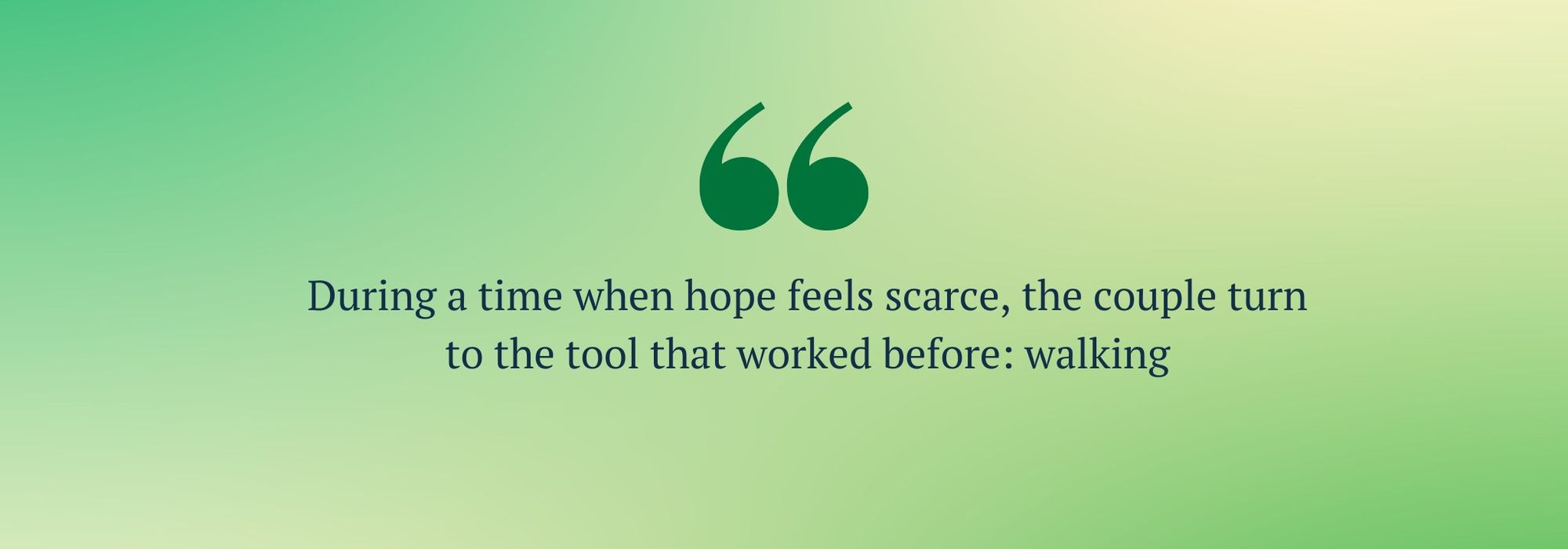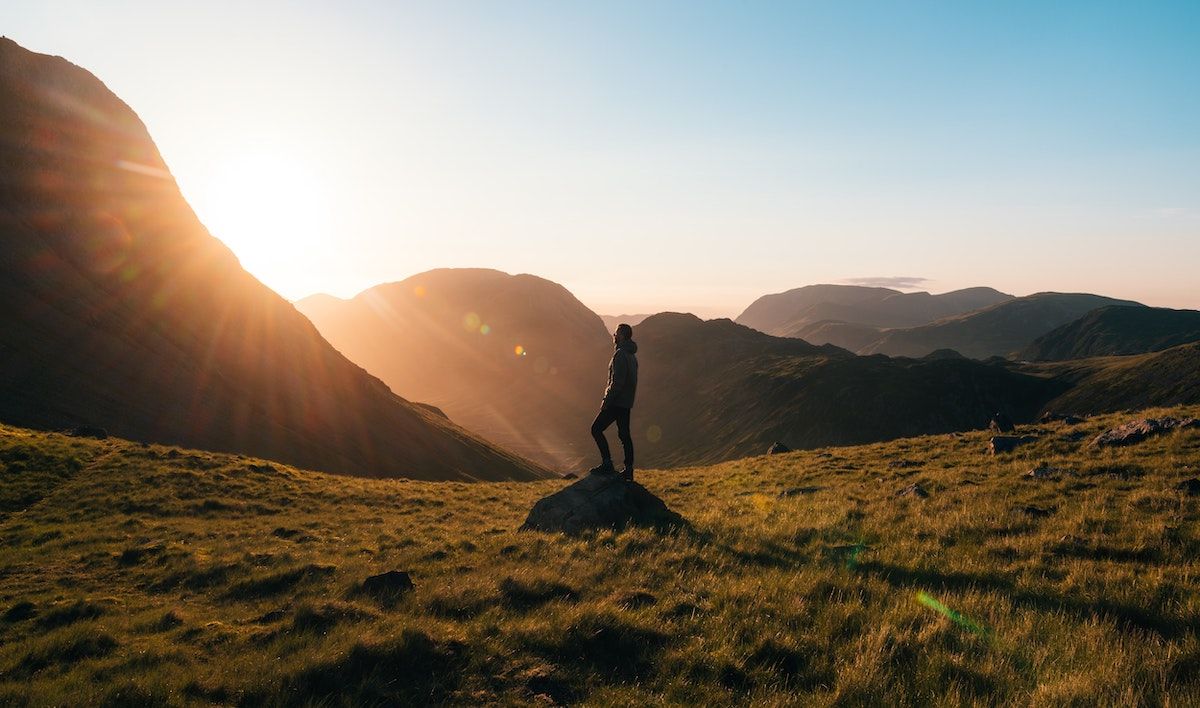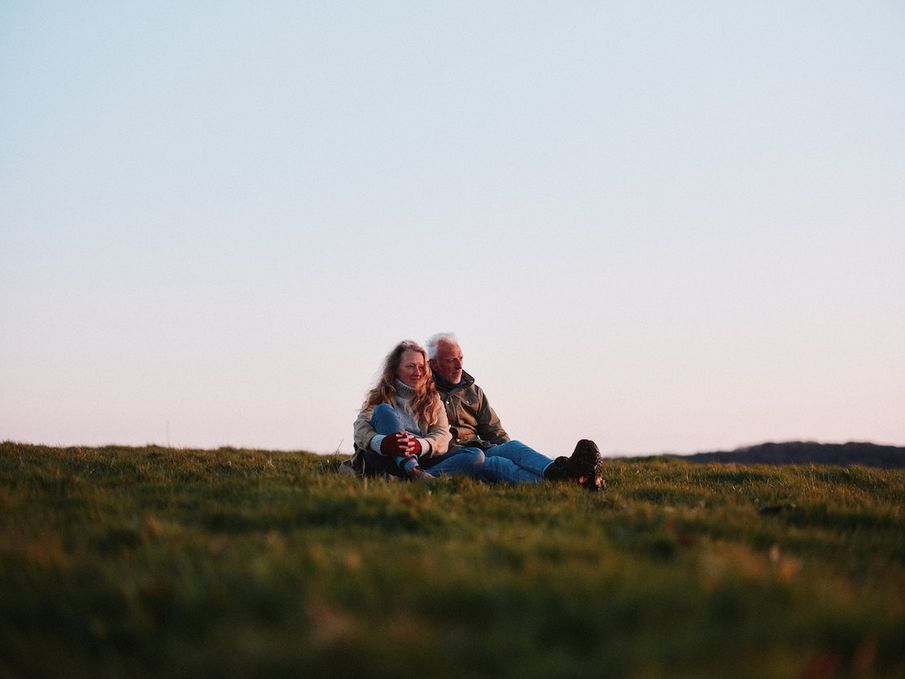Raynor Winn’s books read like folktales, with memorable characters and epic journeys through adversity. So, what have her long-distance walks through Britain’s most challenging terrains taught her about the next steps we should all take for the planet?
When I speak with Raynor Winn, she’s on a week off from her book tour for the paperback release of Landlines, and looking forward to putting a clothes wash on. The million-copy bestselling author of The Salt Path, The Wild Silence, and now Landlines tells a story that began in 2016 when she and her husband Moth were made homeless, at the same time as receiving the news that Moth had an incurable neurodegenerative disease called corticobasal degeneration (CBD).
The couple set off on an adventure like no other, walking the 630-mile South West Coast Path. The story captured many hearts, and so it came as no surprise to me when I saw, the week before our interview, the news that The Salt Path was being adapted into a film, with Gillian Anderson playing the part of Raynor, and Jason Isaacs taking on the role of Moth.
“It’s so funny, isn’t it?” Raynor says, with a laugh. “Just the thought of somebody pretending to be you, I can’t quite get my head around it. It makes no sense!”
But, of course, it does. Raynor’s books have fierce emotional threads that run through them, accompanied by awe-inspiring landscapes, and unforgettable feats of human devotion and perseverance.
At the start of Landlines, Moth’s health is declining. During a time when hope feels scarce, the couple turn to the tool that worked before: walking. They set off to walk the Cape Wrath Trail, more than 200 miles through Scotland’s mountains and lochs. Moments of vulnerability mixed with humour and tenderness are played out on the page. With all that in mind, it’s no surprise that a common review adage for Raynor’s writing is ‘soul-bearing’. But does she agree with that assessment?

“I suppose,” she says, after some thought. “Because when I wrote The Salt Path, I wasn’t writing it for public consumption. I was just writing it for Moth, thinking he was going to be the only person who would read it. But that’s quite good, because when I come and chat to people, they feel like they know me already.”
When she meets readers, Raynor says that people are drawn to the idea of, when life deals you a blow, getting up and finding a way through. It’s a sentiment that feels particularly relevant these days. For all our individual challenges, there’s one such moment, a collective trauma, that all of us now share: the Covid-19 pandemic. Landlines begins in 2021, and hints of restrictions can be found throughout. Looking back now, Raynor reflects on transformative elements of our time in lockdown.
“We all discovered our local areas, in ways we didn’t know them before. But also, there was that wonderful sense of wildlife finding its space as well. We could hear the birds in ways we never do.
“We learnt so much, didn’t we? We learnt that, actually, we don’t need to commute into a city, and work in an office. And how radically that can change our environment and our quality of life. We learnt so much, and yet we’re not taking the lessons forward, which is quite sad.”
While reading Landlines, I started to notice an undercurrent to the story: moments of protest. I began folding the corner on those pages where examples appeared, to return to later, and by the end my book was bumpy with dog-ears. Was that something Raynor was conscious of, the weaving of her and Moth’s personal journey with national journeys through politics and an environmental crisis?
“I think I had things to say in Landlines,” Raynor reflects. “Things to say about the environment, about how we connect to each other, and how that is sometimes informed by how we connect to the land. I think I was walking through a really strange moment when we’d all just come out of lockdown and we’re looking at how we connect with each other, how we interact with each other.
“We were also just realising what Brexit really meant, and we were considering the Scottish independence question. And yes, there are elements of protest in there, because I do have a real overriding sense that we need to find that connection to nature very, very soon, because time is ticking on that.”
For all the difficult things that Raynor witnessed during her walk, there were many moments of hope. Forging connections with kind and quirky strangers, becoming awestruck by the beauty of the environment, and by the passion of the next generation, leading a way into the wild and rekindling a love of the outdoors.

“In Scotland, they have a right to roam act that gives people access to the natural world,” Raynor explains. “They have the right to pass over the land in order to further their understanding of their natural heritage. In England, we don’t have that. But in the north, we saw this incredible sense of young people belonging in the landscape.”
She recalls being near Suilven, in Assynt, where there is a mountain that’s notoriously difficult to climb. It was a Wednesday evening, and streams of young people were coming out of the village and heading towards the mountain. Raynor explains that such access isn’t available in the south, where public footpaths and wild camping face creeping restrictions.
“How are we going to encourage people to connect to nature and drive towards protecting the climate, and try to attempt to reverse this climate crisis if we can’t actually allow them to connect to the natural world?
“There are so many ways we need to approach this, and we’re just not thinking outside our tiny restrictive land ownership box. Now, you see, I can rant – I can rant about that all day.”
It’s a rant worth having. And setting the world to rights with Raynor – on everything from homelessness (“The answer was always there, we just chose not to use it – just think of lockdown’s Everyone In initiative”) to managing eco-anxiety, alongside optimism for a better future – feels productive. Speaking of which, what is her outlook for what’s ahead?
“It’s our lack of respect for nature that’s brought us to this point in the first place,” Raynor reflects. “And our only hope to actually halt the progression is if we all regain that sense of being part of it.
“Whatever’s happening to the natural world is happening to us, too. So, if we can actually all develop our wild side a bit more, then maybe we’ll start to take on that idea that we’re not just losing the cuckoos or whatever vegetation is disappearing – it’s actually our own existence that’s being impacted, too. Then maybe the two, hand-in-hand, will take us forward.”

‘Landlines’ by Raynor Winn (Penguin Michael Joseph, £10.99) is out now.
Photography credit for header image | Stuart Simpson


Comments